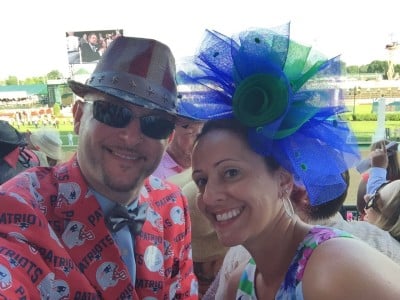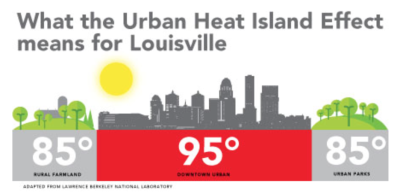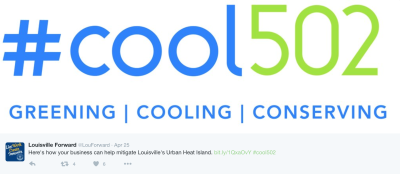
A trip to Louisville, Kentucky, opens our eyes to the city's struggle with hotter weather and the urban heat island effect.
I am just back from my very first trip to Louisville for the Kentucky Derby. From the hats and the horses to the celebrities and the mint juleps, it is truly a worthwhile bucket list item to check off.
It was definitely HOT at Churchill Downs on Saturday and as those of you watching saw, there was a crazy rainstorm that lasted about 5 minutes during the national anthem completely drenching Lady Antebellum. As it turns out, the heat at the track is not the problem. The urban heat island effect is a big problem in Louisville, where parts of the City like downtown can be 10 degrees hotter with loads of public health impacts.
A 2014 report by Climate Central, “Summer in the City: Hot and Getting Hotter", put Lousiville in the top 10 cities with the “most intense summer urban heat islands” over the last decade. That’s bad news for Louisville residents and visitors, given that “Heat is the No.1 weather-related killer in the U.S., and the hottest days, particularly days over 90°F, are associated with dangerous ozone pollution levels that can trigger asthma attacks, heart attacks, and other serious health impacts.”
 Image depicting temperatures of 85 degrees at rural farmland and urban parks and 95 downtown.
Image depicting temperatures of 85 degrees at rural farmland and urban parks and 95 downtown.Fortunately Louisville is taking action to address it.
As Louisville Mayor Greg Fischer said, “We know that too often the ZIP code where you are born can correlate with negative health outcomes. That’s unacceptable.”
Through the Urban Heat Island Project, the City commissioned an Urban Heat Management Study, which is now available for public comment. The study outlines the causes of urban heat island around Louisville and provides a set of recommended solutions to address it -- everything from installing “cool” or “green” roofs to increasing tree cover to planting grasses.
The Mayor also launched the Cool502 initiative, that includes "an online database where residents can search for their neighborhoods, identify their primary heat island challenges and pinpoint the exact number of cooler roofs or additional trees that will help measurably lower summer temperatures." (Source: WFPL) Louisville residents are encouraged to share their cooling efforts on social media using the hashtag #cool502. 
Fischer is calling the initiative “Cool502,” and is encouraging residents to share their cooling efforts on social media using the hashtag: #cool502.
I will look forward to checking in on their progress implementing the study's recommendations during my trip to Derby next year!



